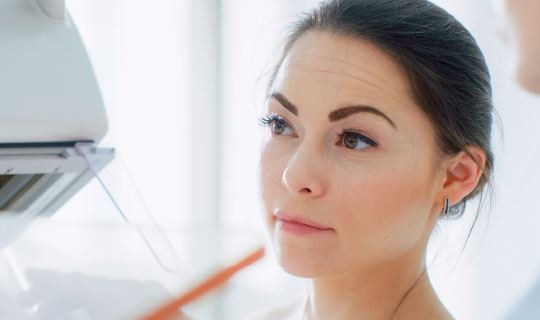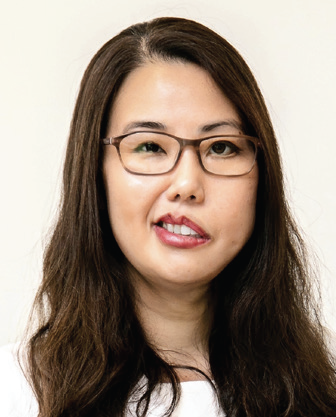
Clara Maass Medical Center offers treatment options based on tumor type.

For a disease as personal as breast cancer, it’s fitting that, now more than ever before, treatments can be personalized.
“We want to provide patients with options,” says Maria J. Kowzun, MD, FACS, Director of the Center for Breast Health and Disease Management at Clara Maass Medical Center (CMMC), accredited by the National Accreditation Program for Breast Centers, a Quality Program of the American College of Surgeons.
With the help and support of Physician Assistant Daniela Villaman, PA-C, and Nurse Navigator Michelle Ashley, MSN, RN, Dr. Kowzun treats each patient according to their specific needs.
Cancer Cells Can Be Tested
Tumors can be analyzed with the latest advanced tests, and knowing the biology of a malignancy can guide therapy decisions.
Oncotype DX tests are called “genomics’’ because they study how a set of genes behaves, including how likely tumors will grow and spread. Those insights help determine whether a patient needs aggressive chemotherapy, radiation, surgery or targeted drugs—or if fewer steps can save their life and thwart the return of the cancer.
Clinical Trials Offer More Options
Dr. Kowzun says the ongoing I-SPY2 trial for high-risk early-stage breast cancer is groundbreaking and has opened avenues for new treatments and treatment combinations for some of her patients. The trial, which is currently recruiting new patients, is available at Rutgers Cancer Institute of New Jersey in New Brunswick and Cooperman Barnabas Medical Center in Livingston. Repeat scans and biopsies monitor a patient’s response. “If she’s doing well, that’s great. If not, she can be offered something potentially better and be transferred to a different arm of the clinical trial,” says Dr. Kowzun.
This research may change the types of treatment given and the order in which it is rendered. “In the past, we’d normally recommend chemotherapy, with its associated toxicity, before surgery for locally advanced breast cancer,” she says. “The ongoing trial offers more options, including oral alternatives to traditional chemotherapy.” Also, in cases where a mastectomy once would have been the only surgical option, lumpectomies with oncoplastic tissue rearrangement with plastic surgery are now possible. CMMC’s Center for Breast Health and Disease Management also helps patients enroll in other trials tailored to their particular type and stage of cancer.
Customized Patient Care
Two relatively new additions to Dr. Kowzun’s team—Nurse Navigator Michelle Ashley, MSN, RN, and Physician Assistant Daniela Villaman, PA-C—are helping to make the experience of patients with breast cancer a little easier. “They have strong empathetic skills and help patients understand complex information while dispelling myths,” says Maria J. Kowzun, MD, FACS, Director of the Center for Breast Health and Disease Management. Here, Ashley and Villaman talk about their new roles.
How do you help patients?
Nurse Navigator Michelle Ashley: I troubleshoot, helping patients overcome barriers from diagnosis to post-treatment survivorship or end-of-life care.
Physician Assistant Daniela Villaman: I provide medical care, do breast exams and, as a native Spanish speaker, translate for patients who are not fluent in English. I can answer questions about treatment and help them reach specialists and avoid delays.
What does your role entail day-to-day?
MA: I take notes at doctors’ appointments and follow up to see if patients understand instructions. As I see it, I work for the patient. I serve as their advocate in their cancer journey and connect them to resources. They have my cell number—and I can call doctors and other health care providers.
DV: I see patients in the office and at the hospital for benign breast conditions. I order imaging and medications. I also refer patients to physical therapy, plastic surgery, radiation and chemotherapy, and I help Dr. Kowzun with breast cancer surgeries.
How do you make cancer journeys easier?
MA: It can be overwhelming when patients learn they have cancer. I’m there to comfort them and their families. We go over the treatment process and review goals.
DV: I help them emotionally. For patients who only speak Spanish, I eliminate a whole level of anxiety about understanding what doctors say.
What motivates you?
MA: I’m inspired seeing women transform as they find strength within. I develop deep relationships and keep in touch long after care ends. Some patients message me years later. That’s so rewarding.
DV: I work with experts in radiation, medical oncology, genetics and plastic surgery who strive to provide the best outcomes for our patients. That’s truly inspiring.
Determining Genetic Risks
If you’ve been diagnosed with breast cancer, your risk of other cancers may be higher. Genetic testing that can help predict personal lifetime risk of breast cancer is significantly more advanced than it was just a decade ago, according to Dr. Kowzun. For instance, a Myriad Genetics panel can study 48 genes linked to 11 different cancers, including breast and ovarian cancer. The panel and other such tests can also reveal gene flaws that can spur other cancers with high incidence rates, including lung, colorectal and pancreatic cancers.
Spotting genetic defects helps oncologists choose preventive therapies, such as tamoxifen or raloxifene for BRCA1 and BRCA2 mutations.
If you have not been diagnosed with breast cancer but are concerned about a family pattern or history of the disease, Dr. Kowzun suggests seeing a genetic counselor who can order the tests you that are appropriate for you and your specific needs.
To schedule an appointment at the Center for Breast Health and Disease Management at Clara Maass Medical Center, call 844-CANCERNJ or 844-226-2376.